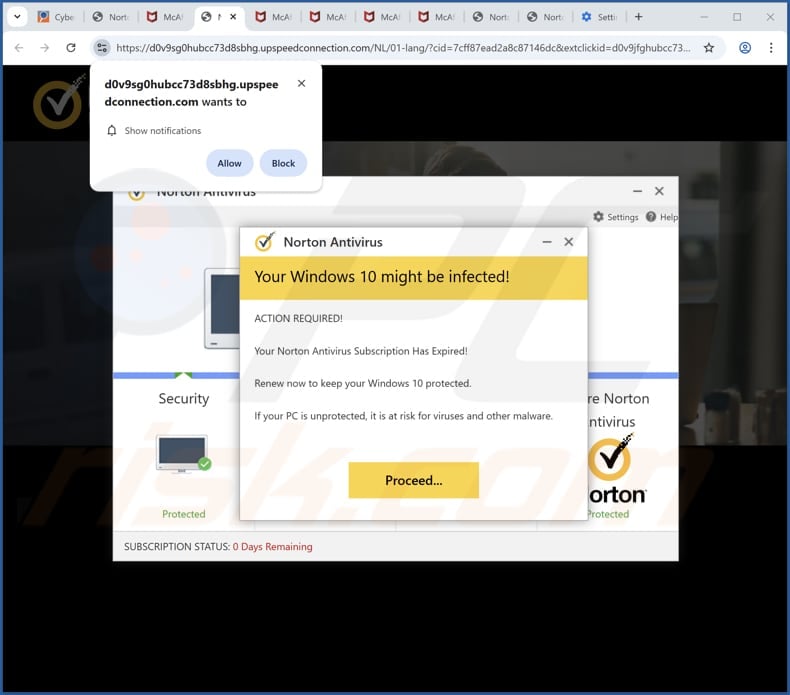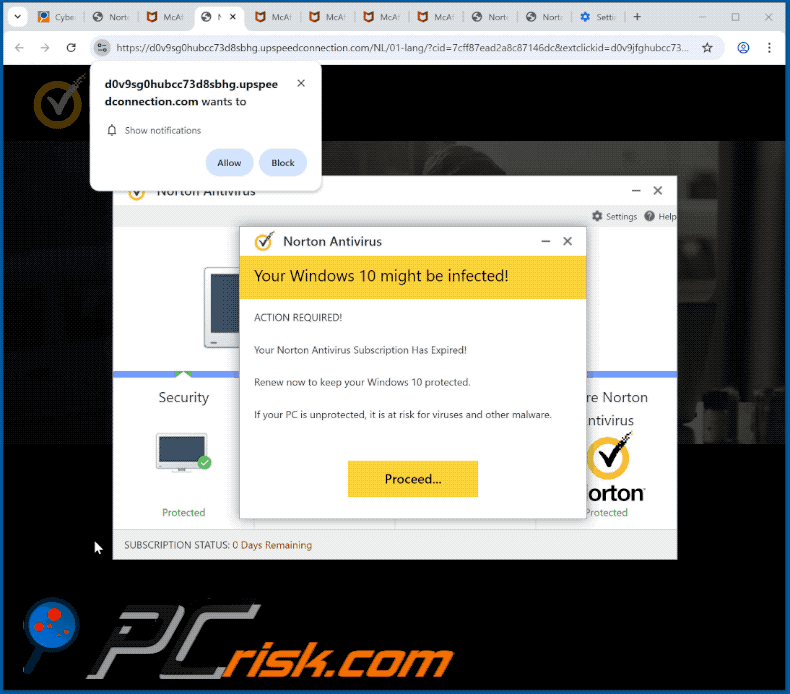How to avoid scams like "Norton Antivirus - Your Windows 10 Might Be Infected"
Phishing/ScamAlso Known As: Norton Antivirus - Your Windows 10 Might Be Infected fake warning
Get free scan and check if your device is infected.
Remove it nowTo use full-featured product, you have to purchase a license for Combo Cleaner. Seven days free trial available. Combo Cleaner is owned and operated by RCS LT, the parent company of PCRisk.com.
What is "Norton Antivirus - Your Windows 10 Might Be Infected"?
We have examined the page and discovered that it uses scare tactics to trick visitors into taking specific actions. Typically, scam websites like these are accessed unintentionally. Falling for them can lead to monetary loss, data theft, or other issues. Thus, users should be able to identify them to avoid the associated risks.

"Norton Antivirus - Your Windows 10 Might Be Infected" scam in detail
The site performs a fake system scan and then displays a deceptive message (a fake alert). It falsely claims that the visitor's Windows 10 is infected and urgently needs attention. It displays a warning stating that the user's Norton Antivirus subscription has expired and urges immediate renewal to continue protecting the system.
The page also says that an unprotected PC is vulnerable to viruses and malware and pushes the visitor to click the provided button to "renew the subscription". It is likely operated by affiliates who seek to earn commissions by driving traffic to another website. These affiliates aim to manipulate users into paying for a security software subscription.
The goal is to generate revenue through false claims. In reality, the warnings are not from Norton or any legitimate security provider. It is important to note that fraudsters behind such pages may also collect personal information during the fake renewal process, such as names, email addresses, payment details, credit card numbers, etc.
Either way, users should avoid clicking on any buttons, links, or pop-ups and instead close the page immediately. In addition to presenting deceptive content, the site wants to show notifications, and this permission should not be granted as well. Doing so can expose users to other scams, potentially malicious apps, and websites.
| Name | Norton Antivirus - Your Windows 10 Might Be Infected fake warning |
| Threat Type | Phishing, Scam, Social Engineering, Fraud |
| Fake Claim | Your Windows 10 might be infected |
| Disguise | Legitimate security warning |
| Related Domain | upspeedconnection[.]com |
| Detection Names (upspeedconnection[.]com) | Seclookup (Malicious), Sophos (Suspicious), Full List Of Detections (VirusTotal) |
| Symptoms | Fake error messages, fake system warnings, pop-up errors, hoax computer scan. |
| Distribution methods | Compromised websites, rogue online pop-up ads, potentially unwanted applications. |
| Damage | Loss of sensitive private information, monetary loss, identity theft, possible malware infections. |
| Malware Removal (Windows) |
To eliminate possible malware infections, scan your computer with legitimate antivirus software. Our security researchers recommend using Combo Cleaner. Download Combo CleanerTo use full-featured product, you have to purchase a license for Combo Cleaner. 7 days free trial available. Combo Cleaner is owned and operated by RCS LT, the parent company of PCRisk.com. |
Conclusion
In conclusion, this website is clearly deceptive and should not be trusted. It uses fake security alerts and scare tactics to trick users into paying for a subscription through an affiliate link. To stay safe, users should close the page immediately and avoid interacting with any part of it.
More examples of fraudulent pages that use similar tactics to deceive users are "Norton - Scan Your Windows PC For Viruses In Seconds", "Security Center Total Protection", and "Apple Mac Security Center POP-UP Scam". Sometimes, these scams can be used to steal sensitive information or distribute malware.
How did I open a scam website?
These pages are often promoted via pop-ups, fake download buttons, or links on shady streaming, torrenting, or adult sites (or similar platforms). Spam emails or push misleading notifications from previously visited shady sites can also direct users to unreliable web pages, including those hosting scams.
Sometimes, they can be accessed via advertisements presented by adware or links received via social media from fake or stolen accounts. Either way, users do not open such web pages on purpose.
How to avoid visiting scam pages?
Avoid granting notification permissions to suspicious websites. Do not click on pop-ups, ads, or any interactive elements on untrustworthy pages. Be cautious with unexpected emails or messages from unfamiliar senders and do not open file or links they contain. Always download software from reliable sources, such as official app stores or well-known websites.
Make sure your operating system and apps are regularly updated to patch security vulnerabilities. Using reputable antivirus or security software can also help safeguard your device against threats. If your computer is already infected with unwanted apps, we recommend running a scan with Combo Cleaner Antivirus for Windows to automatically eliminate them.
The appearance of "Norton Antivirus - Your Windows 10 Might Be Infected" pop-up scam (GIF):

Text in the fake warning:
Norton Antivirus
Your Windows 10 might be infected!ACTION REQUIRED!
Your Norton Antivirus Subscription Has Expired!
Renew now to keep your Windows 10 protected.
If your PC is unprotected, it is at risk for viruses and other malware.
[Proceed...]
Instant automatic malware removal:
Manual threat removal might be a lengthy and complicated process that requires advanced IT skills. Combo Cleaner is a professional automatic malware removal tool that is recommended to get rid of malware. Download it by clicking the button below:
DOWNLOAD Combo CleanerBy downloading any software listed on this website you agree to our Privacy Policy and Terms of Use. To use full-featured product, you have to purchase a license for Combo Cleaner. 7 days free trial available. Combo Cleaner is owned and operated by RCS LT, the parent company of PCRisk.com.
Quick menu:
- What is Norton Antivirus - Your Windows 10 Might Be Infected fake warning?
- How to identify a pop-up scam?
- How do pop-up scams work?
- How to remove fake pop-ups?
- How to prevent fake pop-ups?
- What to do if you fell for a pop-up scam?
How to identify a pop-up scam?
Pop-up windows with various fake messages are a common type of lures cybercriminals use. They collect sensitive personal data, trick Internet users into calling fake tech support numbers, subscribe to useless online services, invest in shady cryptocurrency schemes, etc.
While in the majority of cases these pop-ups don't infect users' devices with malware, they can cause direct monetary loss or could result in identity theft.
Cybercriminals strive to create their rogue pop-up windows to look trustworthy, however, scams typically have the following characteristics:
- Spelling mistakes and non-professional images - Closely inspect the information displayed in a pop-up. Spelling mistakes and unprofessional images could be a sign of a scam.
- Sense of urgency - Countdown timer with a couple of minutes on it, asking you to enter your personal information or subscribe to some online service.
- Statements that you won something - If you haven't participated in a lottery, online competition, etc., and you see a pop-up window stating that you won.
- Computer or mobile device scan - A pop-up window that scans your device and informs of detected issues - is undoubtedly a scam; webpages cannot perform such actions.
- Exclusivity - Pop-up windows stating that only you are given secret access to a financial scheme that can quickly make you rich.
Example of a pop-up scam:

How do pop-up scams work?
Cybercriminals and deceptive marketers usually use various advertising networks, search engine poisoning techniques, and shady websites to generate traffic to their pop-ups. Users land on their online lures after clicking on fake download buttons, using a torrent website, or simply clicking on an Internet search engine result.
Based on users' location and device information, they are presented with a scam pop-up. Lures presented in such pop-ups range from get-rich-quick schemes to fake virus scans.
How to remove fake pop-ups?
In most cases, pop-up scams do not infect users' devices with malware. If you encountered a scam pop-up, simply closing it should be enough. In some cases scam, pop-ups may be hard to close; in such cases - close your Internet browser and restart it.
In extremely rare cases, you might need to reset your Internet browser. For this, use our instructions explaining how to reset Internet browser settings.
How to prevent fake pop-ups?
To prevent seeing pop-up scams, you should visit only reputable websites. Torrent, Crack, free online movie streaming, YouTube video download, and other websites of similar reputation commonly redirect Internet users to pop-up scams.
To minimize the risk of encountering pop-up scams, you should keep your Internet browsers up-to-date and use reputable anti-malware application. For this purpose, we recommend Combo Cleaner Antivirus for Windows.
What to do if you fell for a pop-up scam?
This depends on the type of scam that you fell for. Most commonly, pop-up scams try to trick users into sending money, giving away personal information, or giving access to one's device.
- If you sent money to scammers: You should contact your financial institution and explain that you were scammed. If informed promptly, there's a chance to get your money back.
- If you gave away your personal information: You should change your passwords and enable two-factor authentication in all online services that you use. Visit Federal Trade Commission to report identity theft and get personalized recovery steps.
- If you let scammers connect to your device: You should scan your computer with reputable anti-malware (we recommend Combo Cleaner Antivirus for Windows) - cyber criminals could have planted trojans, keyloggers, and other malware, don't use your computer until removing possible threats.
- Help other Internet users: report Internet scams to Federal Trade Commission.
Frequently Asked Questions (FAQ)
What is a pop-up scam?
A pop-up scam is a type of online scam in which deceptive pop-up messages appear in a user's browser, often claiming something alarming or urgent—such as a virus infection, expired software subscription, or security breach.
What is the purpose of a pop-up scam?
Scammers use these scams to trick users into paying for fake products or services, downloading unwanted (and sometimes malicious software), disclosing personal information, or taking other actions.
Why do I encounter fake pop-ups?
Users typically end up on these scam pages showing fraudulent pop-ups unintentionally, often through deceptive ads, fake download buttons, or links on shady sites. They may also be redirected via spam emails, misleading notifications, adware-driven ads, or links shared by fake or compromised social media accounts.
Will Combo Cleaner protect me from pop-up scams?
Combo Cleaner is built to scan every website you visit and can identify those that are malicious. This includes sites that host pop-up scams. When such a site is detected, you will receive an immediate warning, and access to the page will be blocked.
Share:

Tomas Meskauskas
Expert security researcher, professional malware analyst
I am passionate about computer security and technology. I have an experience of over 10 years working in various companies related to computer technical issue solving and Internet security. I have been working as an author and editor for pcrisk.com since 2010. Follow me on Twitter and LinkedIn to stay informed about the latest online security threats.
PCrisk security portal is brought by a company RCS LT.
Joined forces of security researchers help educate computer users about the latest online security threats. More information about the company RCS LT.
Our malware removal guides are free. However, if you want to support us you can send us a donation.
DonatePCrisk security portal is brought by a company RCS LT.
Joined forces of security researchers help educate computer users about the latest online security threats. More information about the company RCS LT.
Our malware removal guides are free. However, if you want to support us you can send us a donation.
Donate
▼ Show Discussion